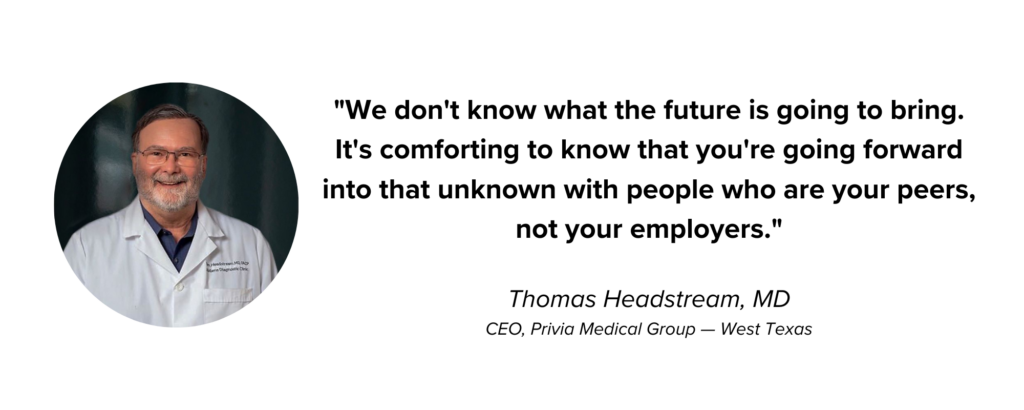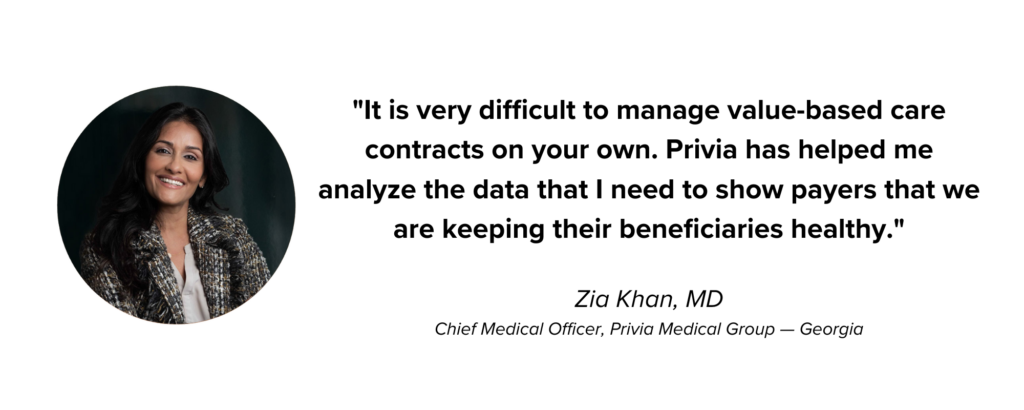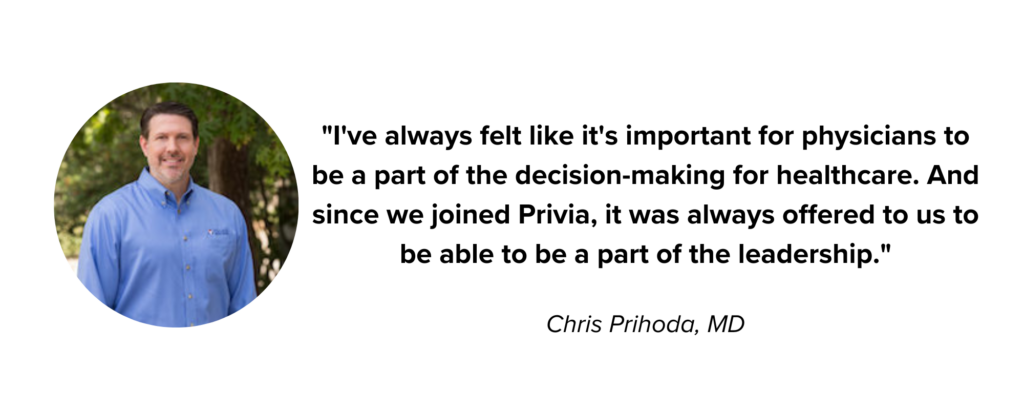The future of healthcare is uncertain, unknown, unwritten. However, given the industry’s current trajectory, it’s safe to assume there will be less independent physicians.
In 2012, only 14 percent of physicians were employed. Today, the majority of doctors are employed.
Independent doctors are an integral part of the healthcare landscape. Reports suggest that many patients choose to go to private practices for a “greater level of personalization and responsiveness to patient needs.”
Fortunately, the physician enablement sector has also seen explosive growth in recent years. These dedicated partners can futureproof private practices by helping independent doctors:
- Stabilize Practice Operations
- Enter & Excel in Value-Based Care
- Balance Autonomy & Collaboration
Stabilize Practice Operations
The steep, rapid rise of physician employment begs the question: Why are clinicians leaving private practice?
- Financial insecurity. Private practices typically lack the scale and leverage to negotiate higher fee schedules. Additionally, practice owners often can’t afford specialists to optimize their revenue cycle management (RCM) or value-based care performance, which can lead to lost revenue.
- Tedious administrative tasks. As small business owners, independent physicians must oversee contracting, IT, marketing, and other operational processes. This time-consuming “administrivia,” as Amber Lesley, MD, calls it, detracts from patient care and, with it, reimbursements.
- Staffing challenges. Financial stress and cumbersome non-clinical workloads can increase burnout. The Medical Group Management Association (MGMA) found that 40 percent of medical groups had a physician retire early or leave due to burnout in 2022. Private practices struggle to backfill vacancies as research shows more than 90 percent of “physicians accepting new positions today … will practice as employees.”
Hear one doctor’s perspective on why the future of healthcare depends on physician leadership.
There is no overnight cure for these complex challenges, but physician enablement organizations are a promising solution. These partnerships equip care teams with the tools, expertise, and resources to run an efficient, patient-focused, sustainable practice. When exploring potential partnerships, be sure to ask:
- How can your contracting, RCM, and fee-for-service support drive revenue while assisting my transition to value-based care?
- What services do you offer to decrease my administrative burden so I can focus on patients?
- How do you recruit providers to sustain — or grow — my practice?

Enter & Excel in Value-Based Care
Research from the Commonwealth Fund indicates less than half of primary care physicians receive payments through shared savings or capitation models. And the Health Care Payment Learning & Action Network (LAN) found that only six percent of healthcare spending went to population-based arrangements. Taken together, these stats highlight the difficulty of value-based care for private practices, which often encounter three obstacles:
- Doctors wearing too many hats. Value-based care is a team sport. However, hiring a team of population health analysts, care coordinators, and consultants to review continual regulatory changes is simply too expensive for private practices. As a result, doctors take on these roles — in addition to patient care and practice management — only to find themselves overwhelmed and unsuccessful.
- Learning curve. Even with a full-fledged team, doctors new to value-based care still require ongoing education to adjust their workflows properly. One proven strategy is joining an organized, collaborative network of fellow physicians to learn from and grow with. Unfortunately, these groups sometimes lack the data, structure, and clinical leadership to effectively coach newcomers.
- Ineffective technology. Value-based care is data-driven, but many electronic health records (EHRs) fail to produce accurate, comprehensive, or actionable data. Without integrated features like payer-specific quality measures, risk stratification, and tiered referrals, physicians may struggle to satisfy key metrics and, consequently, underperform.
 See Privia’s Chief Technology Officer discuss the impact of digital tools on the value-based future of healthcare.
See Privia’s Chief Technology Officer discuss the impact of digital tools on the value-based future of healthcare.
Again, a physician enablement partner with proven, consistent success in value-based arrangements can help guide private practices through the volume-to-value transition. To simplify this journey, look for a partner that:
- Includes a management services organization (MSO) to streamline practice operations and reduce your workload to allow more time and attention to value-based care
- Unites local doctors in physician-led governance to routinely review key performance indicators and exchange insights
- Offers an EHR that is tailored to value-based care with end-to-end support for attributed patients

Balance Autonomy & Collaboration
Autonomy, both as a clinician and small business owner, is the primary reason physicians pursue private practice. As with any decision, there are tradeoffs. According to the American Medical Association (AMA), independent doctors report feeling “professionally isolated” despite a desire to “network with other doctors around the country.” This leads some to join physician groups, such as an accountable care organization (ACO), but these groups may lack a sense of community for several reasons.
- Limited leadership opportunities. Physician-led organizations are powerhouses; research shows that physician-led ACOs generated nearly seven times more savings than those without. Few groups offer robust openings for motivated doctors. To truly excel, groups should have a wide variety of positions to fit members’ unique areas of expertise.
- Disengaged docs. Banding together with like-minded, high-performing doctors is about much more than gaining leverage for better rates. The constant evolution of payer trends, patient expectations, and policies stokes uncertainty. Some physician groups fail to foster alignment, camaraderie, and resilience needed to weather the changes.
- Narrow scope. Primary care comprises the core of many physician organizations. However, many exclude specialists, who greatly contribute to lowering the group’s total costs across the care continuum. Similarly, groups may only participate in one area, such as Medicare Advantage, at the expense of other valuable arrangements.
 Watch doctors share how Privia amplifies clinical voices to drive engagement, build alignment, and change the future of healthcare.
Watch doctors share how Privia amplifies clinical voices to drive engagement, build alignment, and change the future of healthcare.
The ideal physician enablement partner understands that protecting your autonomy is vital. A partnership can, paradoxically, increase your autonomy by offloading administrative work and prioritizing patient care. By joining the right partner, you don’t lose your voice, you gain a community and platform. To avoid sacrificing your autonomy, look for a partner that:
- Actively champions physician leadership through training programs and positions that align with your interests and preferences (e.g., clinical informatics or vaccine research, small task force or high-level advisory council, local or national role)
- Hosts regular summits that bring doctors together to network and contribute to the organization’s strategic goals
- Builds cohesive yet diverse physician networks that span all payment models












Related Articles
How to Keep Your Patients From Skipping Mammograms
Kristin Schraa, MD, with Virginia Women’s Center shares how women’s health providers can encourage patients ...
3 Ways Healthcare Can Integrate Behavioral Health and Primary Care
Integrating behavioral health with primary care can lead to better patient outcomes — but how ...
How Can Physicians Support Postpartum Mental Health?
On average, 13 percent of mothers in the United States will develop symptoms of postpartum ...
Engaging Patients in Annual Mammograms
Studies show that a little over 66 percent of women aged 40 and older get ...
What Do Medicare-Aged Patients Want in Their Healthcare?
Within the next 20 years, 20 percent of Americans will be 65 or older. It ...
How Health Systems Grow Stronger With Privia Health
Discover how we helped Health First upgrade technology, align physicians, and accelerate toward value-based care. ...